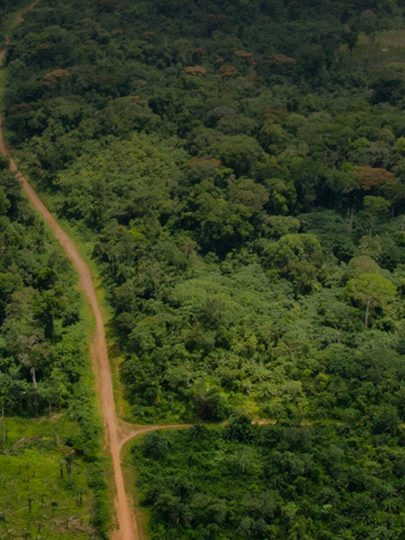

Macquarie 50th Anniversary Award
Illness is universal; healthcare is not. Last Mile Health is creating a world where a health worker is within reach of everyone, everywhere.
Last Mile Health helps to save lives in the world’s most remote communities by partnering with government to professionalise community health workers and embed them in systems that enable their success.
provided with essential healthcare services1
community and frontline health workers supported in Liberia, Ethiopia and Malawi1
people in Liberia, Ethiopia and Malawi provided with community-based primary healthcare1
Last Mile Health is dedicated to delivering lifesaving healthcare to some of the world's most vulnerable . Since winning the Macquarie 50th Anniversary Award 2019, the organisation has significantly strengthened its operations in Liberia by enhancing community health worker training and improving data collection systems. Furthermore, Last Mile Health has expanded its reach into Malawi and Ethiopia, providing essential healthcare services to millions more in need. By leveraging technology, they have enhanced health worker training and community-level data collection, resulting in more efficient healthcare delivery.
Since 2019, Last Mile Health has supported 15,750 community and frontline health workers across Liberia, Ethiopia, and Malawi, helping ensure that 20,010,600 people in these countries have access to community-based primary healthcare.1
Macquarie's support has been instrumental in enabling key collaborations with governments and other essential partners. This support has facilitated the development and implementation of policies that prioritise community-based healthcare, such as Malawi's National Community Health Framework.
With support from Macquarie, we have recruited, trained, and deployed thousands of community health workers across Liberia, Malawi, and Ethiopia - ensuring millions of people living in rural and remote communities can access the life-saving care they deserve.”
Lisha McCormick
CEO
Last Mile Health
My highlight was when we had the privilege of welcoming Last Mile Health and its partners at our New York office to host their event during the United Nations General Assembly in late 2024.
The discussions focused on the critical intersection between health and climate, and featured community health workers from Zambia, Sierra Leone and Kenya. Their stories showed how community health workers are already working as essential responders to the health impacts of climate change, underscoring the importance of designing solutions to the climate challenge that put communities at the heart of the conception and implementation processes.”
Dario Traum
Head of Climate Intelligence Unit
Macquarie Group, Paris
By 2028, Last Mile Health is on track to provide over 26 million people with access to healthcare on a regular basis.1
In this video, hear from Dalitso Baloyi, Country Director, Malawi for Last Mile Health as he talks about the organisation’s mission to expand access to high-quality, primary healthcare for remote communities across Africa.
In FY2024, Last Mile Health’s programs in Liberia, Malawi and Ethiopia have seen demonstrable evidence of the power of technology to improve health worker training and community-level data collection at scale.
In Liberia, the digitisation of the national Community Based Information System design is being actively tested and strengthened to lead towards national implementation.
In Malawi, the Community Health Information System is moving beyond development to actual usage and scale, with health topic content integrated into training on the system.
In Ethiopia, following the success of a pilot project, the Ministry of Health is rapidly scaling the first blended learning training module and has developed and launched a second module. The trainings equip community health workers, their supervisors, managers, and health leaders with accessible data and insights supporting the delivery of accurate and high-quality care to patients in even the most remote areas.
In FY2023, in Malawi, where Macquarie catalysed Last Mile Health’s work, the organisation assisted the Government to develop the second National Community Health Framework, which will ensure the program delivers essential primary health services to every person – no matter where they live. Last Mile Health also participated in the design and pilot of an integrated Community Health Information System that provides robust decision support and data collection capabilities for frontline health workers.
In Ethiopia, Last Mile Health showcased the cost-effective, timely and engaging results from the innovative blended training model, which incorporates digital training tools and holds the potential to improve training for up to 40,000 Community Health Workers.1
In Liberia, Last Mile Health continues to partner with the Government to scale the Community Health Worker program. In March 2023, the organisation assisted the Ministry of Health in hosting the third annual International Symposium on Community Health Workers and signed on to the Monrovia Call to Action.
In FY2022, Last Mile Health, in partnership with governments in four countries in Africa, continued to strengthen high-quality, data-driven community health systems, demonstrating the importance of this work in the context of the COVID-19 pandemic. A total of 4.5 million people were served by community health workers that were supervised, skilled, supplied or salaried in partnership between a Ministry of Health and Last Mile Health.1 Community health workers continued to deliver essential primary healthcare to their patients during the pandemic, showing us that health for all can be the legacy of COVID-19 if we invest in community and frontline health workers.
In FY2021, Last Mile Health and the Ministry of Health in Liberia deployed over 3,800 frontline health workers serving more than 770,000 people, whilst also assisting with the local COVID-19 response in Malawi and Ethiopia.1